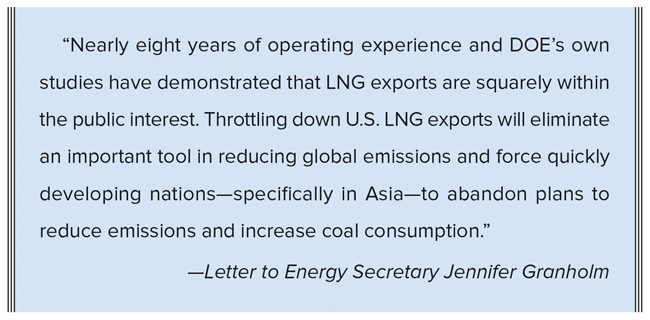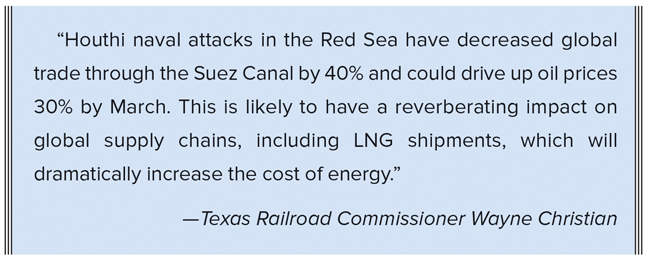
U.S. LNG Export Pause Frustrates Industry
By Del Torkelson
WASHINGTON—A few bubbles rose to the surface in early January, following a couple media reports that the Biden administration might freeze new approvals for liquefied natural gas export terminals until after the 2024 elections. Bigger ripples were visible by mid-January, as more media accounts cited leaks and anonymous sources from within the administration. Those waters started to positively churn in the days immediately preceding the U.S. Department of Energy’s Jan. 26 announcement confirming the rumors.
At that point, DOE acknowledged plans to update how it would assess whether additional LNG export authorization requests to non-Free Trade Agreement countries were in the public interest. Meanwhile, from the earliest rumors to the eventual confirmation, oil and natural gas industry representatives and their allies maintained a consistent response throughout: Election-year political calculations were pushing the president in an imprudent direction.
“President Biden, who appeared to come around on LNG as an energy transition fuel during the gas crisis that followed Russia’s invasion of Ukraine in early 2022, now seems to be doing an about-face to shore up support for his re-election among climate advocates and environmental groups,” assesses Canary LLC Chief Executive Officer Dan Eberhart in Forbes.
Clashing Climate Calculations
President Biden describes his decision to halt and reconfigure the LNG permitting process as a matter of addressing greenhouse gas emissions. “This pause on new LNG approvals sees the climate crisis for what it is: the existential threat of our time,” he says.
However, some counter, the move does not even make sense from a climate standpoint.
A letter to Energy Secretary Jennifer Granholm deems burdensome changes to the U.S. LNG export permitting process an unforced error. The coalition of business and industry groups behind the letter includes the Colorado Oil & Gas Association, New Mexico Oil & Gas Association, North Dakota Petroleum Council, Ohio Oil & Gas Association, Permian Basin Petroleum Association, Petroleum Association of Wyoming, Texas Alliance of Energy Producers, Texas Independent Producers & Royalty Owners Association, Petroleum Alliance of Oklahoma, the Energy Workforce & Technology Council, the Independent Petroleum Association of America and the American Petroleum Institute.
“Any action to halt U.S. LNG export approvals would be a major mistake that puts American jobs and allies at risk while undermining global climate goals,” the letter warns.
That is because curbing U.S. LNG export approvals will weaken global efforts to reduce GHG emissions, the letter says. It goes on to note that, thanks to power sector coal-to-gas fuel switching, no country has cut its carbon dioxide emissions more than the United States.
“At a time when global coal consumption has soared to record highs, eclipsing 8.3 billion tonnes in 2022, America can export our emission reduction success story to countries still heavily reliant on coal,” the coalition writes. “DOE’s National Energy Technology Lab released studies in both 2014 and 2019 that showed U.S. LNG exports for European and Asian markets would significantly reduce life cycle GHG emissions when compared with coal use.
“Nearly eight years of operating experience and DOE’s own studies have demonstrated that LNG exports are squarely within the public interest,” the letter continues. “Throttling down U.S. LNG exports will eliminate an important tool in reducing global emissions and force quickly developing nations—specifically in Asia—to abandon plans to reduce emissions and increase coal consumption.”
Moreover, U.S. Senator John Kennedy, R-La., points out, intermittent power sources such as solar and wind often depend on natural gas. “Because LNG is an effective backup source of generation when renewable resources are limited, using more natural gas to generate electricity also makes it possible to use more renewable energy on the grid,” he writes in a letter to Granholm. “This partnership can help natural gas meet the energy demand of the here-and-now as well as the demand of tomorrow.”
A Washington Post editorial describes Biden’s LNG decision not a win for the climate, but for political symbolism. “You cannot change demand for energy by destroying supply: If the United States did indeed curtail LNG exports, it would just drive customers into the arms of competitors such as Australia, Qatar, Algeria and, yes, Russia,” it assesses. “Quite possibly, some potential customers would choose to meet their needs with coal instead.”
Worldwide Consequences
Many suggest the Biden administration’s decision diverges from U.S. foreign policy goals. For example, U.S. Senator Bill Cassidy, R-La., cautions that it may impair the United States’ ability to fill the supply gaps associated with European countries’ response to Russian President Vladimir Putin’s invasion of Ukraine.
“(Freezing LNG export terminal approvals) is a war on our allies,” Cassidy charges. “They depend on us for their energy and economic security. For apparently political purposes, the Biden administration is deliberately postponing permitting. Putin must have designed this strategy.”
Daniel Yergin, vice chairman of S&P Global and industry historian, offers a similar interpretation. “No one hates U.S. LNG more than Vladimir Putin,” Yergin is quoted in the New York Times.
EWTC President Tim Tarpley also emphasizes the fundamental role U.S. LNG plays in powering the global energy market. “This move by the administration to potentially halt permits for U.S. LNG export facilities will widely disrupt ongoing projects across the Gulf Coast, creating a global economic shockwave across energy markets,” he predicts. “Halting American LNG threatens the reliability of energy production both here at home and abroad. Additional regulatory uncertainty is the last thing American energy needs right now.”
The Texas Independent Producers & Royalty Owners Association points to figures showing that, following Russia’s invasion of Ukraine, European imports of U.S. LNG rose 141% in 2022, with France, the United Kingdom, Spain and the Netherlands importing 74% of U.S. LNG exports.
Recognizing the rising demand, TIPRO President Ed Longanecker notes U.S. natural gas operators have expanded domestic production—successfully outpacing Qatar and Australia—to lead the world in 2023 LNG exports. Last year, the U.S. produced and exported more than 88 million metric tons of LNG, a 14.7% increase compared with 2022. According to the most recent data, Europe remained the largest buyer of U.S. LNG, accounting for 68% of U.S. LNG exports in December 2023.
With Russian analysts claiming their country will successfully produce 200 million tons of LNG annually and lead the world in LNG exports within a decade, Longanecker says, it is vital that U.S. natural gas producers are able to continue scaling energy output to lessen global dependence on adversarial nations.
Texas Railroad Commissioner Wayne Christian offers a lens that extends well beyond Russia and Ukraine in Jan. 23 letter to Biden. “Emboldened by Russia’s actions, Iran has encouraged terrorist-proxy organizations like Hamas, Hezbollah and the Houthis to escalate conflicts in the Middle East,” the commissioner observes. “Houthi naval attacks in the Red Sea have decreased global trade through the Suez Canal by 40% and could drive up oil prices 30% by March. This is likely to have a reverberating impact on global supply chains, including LNG shipments, which will dramatically increase the cost of energy.”
In response to these points, DOE is drawing attention to the United States’ status as the world’s top LNG exporter at 14 billion cubic feet a day in operating capacity. The department adds that construction is underway on even more capacity that already has been approved.
“This temporary pause on pending applications will not affect already authorized exports, which total 48 Bcf/d. It will also not impact our ability to supply our allies in Europe, Asia or other recipients of already authorized U.S. exports,” DOE assures.
“Last year, over 60% of U.S. LNG exports went to Europe, and we have worked with European countries to successfully economize consumption and manage their storage to ensure that Russia cannot threaten their security of supply,” DOE continues. “Within this decade another 12 Bcf/d of U.S. export capacity already authorized and under construction will come on line—enabling exports to nearly double and putting the United States on track to exceed the export capacity of any other country by more than 50%, even taking into account planned global LNG expansion capacity.”
Political Pickle
DOE statements about its decision to pause permitting on pending applications and update its criteria highlight the department’s responsibility to evaluate the public interest of proposed exports to non-FTA countries. “As the natural gas sector has transformed over the past decade, DOE must use the most complete, updated and robust analysis possible on market, economic, national security, environmental considerations, including current authorized exports compared to domestic supply, energy security, GHG emissions including CO2 and methane, and other factors,” the department argues.
Granholm’s statements cast the move as a commonsense response to evolving conditions. “This administration is committed to the affordability of energy and economic opportunities for all Americans; strengthening energy security here in the United States and with our allies; and protecting Americans against climate change and winning the clean energy future,” she maintains. “This practical action will ensure that DOE remains a responsible actor using the most up-to-date economic and environmental analyses.”
However, published reports note that the law places clear limits on the administration’s authority. E&E News cites comments by Tyson Slocum, director of the energy program at the consumer advocacy group Public Citizen, in which he suggests that significant renovations to the process may not survive litigation. “If the DOE’s making any sort of significant change to the criteria, you’ve got to put that through a notice and public comment process,” Slocum is quoted. “Otherwise, the industry can say it was an arbitrary change . . . and courts, especially these days, would likely side with industry on that.”
According to API, the Biden administration’s LNG permit evaluation already has extended a process that took seven weeks during the Trump administration to one that averages 11 months. For its part, DOE asserts extending reconsideration even further amounts to “nothing new,” maintaining that the categories under evaluation remain the same as ever.
“But the data and global circumstances relevant to these factors have changed over time, and DOE must reflect these changes when applying the factors to a new public interest determination,” the department says. “As the LNG market and related issues are dynamic—including economic, climate change and global energy security considerations—DOE’s LNG program will continuously evaluate evolving national and energy security, economic, environmental and other factors. The pause, which is subject to exception for unanticipated and immediate national security emergencies, will provide the time to integrate these critical considerations.”
But even proponents of the move acknowledge that political considerations loom large for the administration. According to the Times, 25-year-old Colorado social media influencer Alex Haraus received a Zoom meeting with White House staff because of his TikTok and Instagram campaign urging Biden to reject Venture Global LNG’s Calcasieu Pass 2 (CP2) project. The same article indicates the president is “courting climate voters, particularly the young activists who helped him win election in 2020 and who have been angered by his administration’s approval last year of the Willow project, an enormous oil drilling operation in Alaska.”
E&E News indicates that administration officials have contradicted the Times and other reports by saying the permitting freeze will not halt CP2, which is still under review by the Federal Energy Regulatory Commission. “There will be no impact on CP2 from this pause,” E&E News quotes an anonymous administration source.
Ultimately, Jeremy Kupfer argues in the Wall Street Journal, Biden has found himself in a political “pickle” in which some of his loudest political allies are steering him away from prudent policy, much as the same voices prompted President Barack Obama to reject the Keystone XL Pipeline.
“As Mr. Biden prepares for a contentious election, he has a choice: to resist the extremes of his party or to yield to them and risk harming the economy and losing moderate and independent voters,” Kupfer writes. “The president’s comment during last year’s state of the union address—‘we’re still going to need oil and gas for a while’—was right on target. His policies should reflect that reality.
“Mr. Biden would do well to remember that good policy is also good politics,” Kupfer adds. “A great place to start would be by shelving his administration’s unnecessary LNG export review.”
Since the world’s consumers will meet their LNG demand one way or the other, concludes Andrew Stuttaford in National Review Online, any decision by the Biden administration to make the permitting pause into something more permanent merely will force those consumers to obtain the LNG from other sources.
“That means that the United States will have (a) thrown away export revenues and jobs, (b) weakened its credibility with its allies, (c) squandered an opportunity to increase its influence with countries that are . . . less friendly and (d) hand extra profits to countries less likely to let TikTok influence their energy policy.”
Federal Legislation
Some industry advocates such as the Texas Alliance, IPAA and EWTC are asking Congress to address the matter. Those groups are part of a coalition, which also includes the U.S. Oil and Gas Association, National Ocean Industries Association and Gulf Energy Alliance, that is urging Congress to pass the “Unlocking our Domestic LNG Potential Act.” Introduced by Congressman August Pfluger, R-Tx., the legislation seeks to place the Federal Energy Regulatory Commission in charge of all U.S. LNG export permitting.
“Removing DOE from the process will help to ensure that political maneuvers will not interfere with energy supplies,” the coalition holds. “It is vital that Congress send an immediate message to our allies and enemies abroad that U.S LNG will continue to flow uninterrupted for many years to come.”
“It is imperative that political calculations do not get in the way of energy policy that benefits the U.S. economy, provides energy security to our allies abroad, and supports lower emissions worldwide,” EWTC’s Tarpley says. “In 2022, President Biden stood hand in hand with Europe and pledged to provide Europe with additional U.S. LNG exports. Now, this about-face by the administration stands to negatively impact over 115,000 jobs nationwide and an anticipated loss of over $46 billion in gross domestic product. Congress must act immediately to reverse this decision.”
“Plentiful domestic natural gas production as a result of the Shale Revolution made it economical to liquify, transport and export American natural gas while simultaneously bringing prices down at home,” adds IPAA President and Chief Executive Officer Jeff Eshelman. “It’s IPAA’s view that the DOE restricting LNG exports threatens national security, American jobs and global climate goals. We support Rep. Pfluger’s ‘Unlocking Our Domestic LNG Potential Act’ to rightfully put LNG permitting authority with FERC where it belongs.”
“The notion that we need to stop exports to study them is simply not a regulatory requirement. That’s tap dancing for a bad policy. Our allies, particularly in Europe, will pay the price for the DOE’s politically motivated decision,” concludes Western Energy Alliance President Kathleen Sgamma. “As Germany has proven, if our allies don’t have access to U.S. natural gas then they will need to burn more coal to keep the power going. Congress should revoke the licensing requirement and get DOE out of the business of gumming up trade, since natural gas export is so obviously beneficial for our country as much as for our allies.”
For other great articles about exploration, drilling, completions and production, subscribe to The American Oil & Gas Reporter and bookmark www.aogr.com.

















